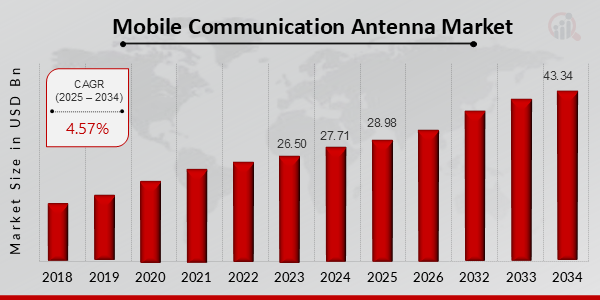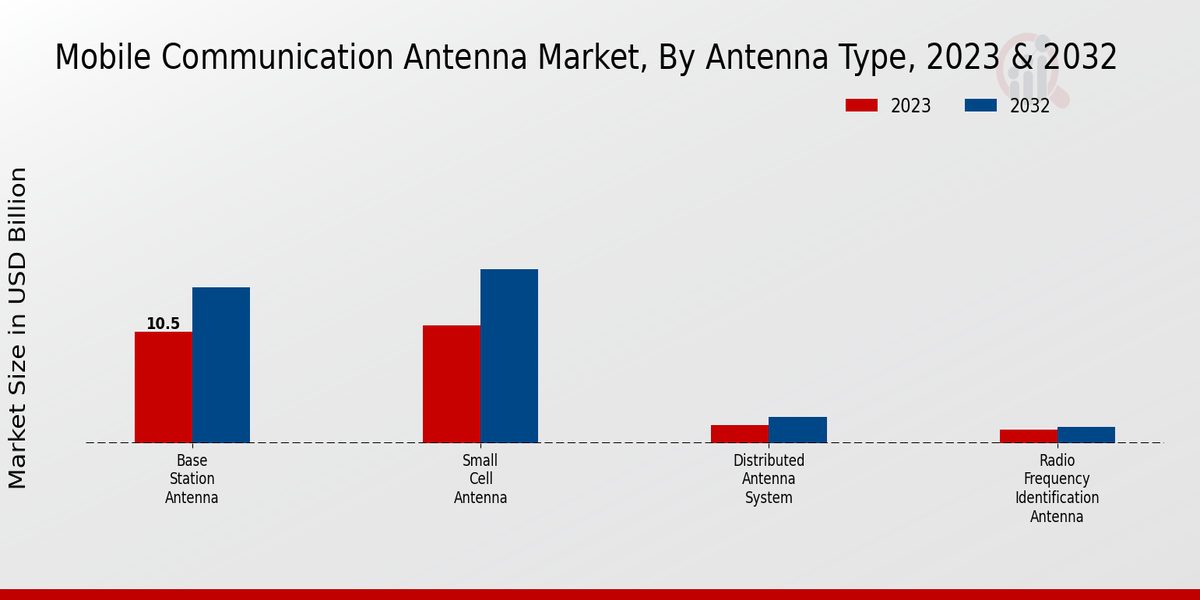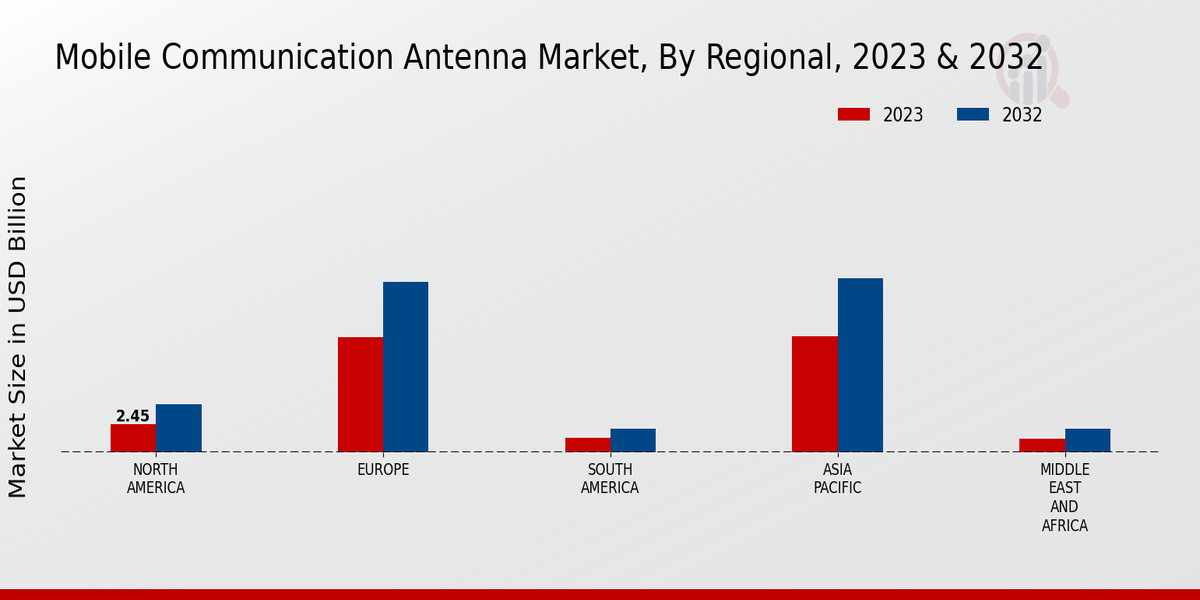Mobile Communication Antenna Market Overview
Mobile Communication Antenna Market is projected to grow from USD 28.98 Billion in 2025 to USD 43.34 Billion by 2034, exhibiting a compound annual growth rate (CAGR) of 4.57% during the forecast period (2025 - 2034).
Additionally, the market size for Mobile Communication Antenna Market was valued at USD 27.71 billion in 2024.
Key Mobile Communication Antenna Market Trends Highlighted
The Mobile Communication Antenna Market exhibits promising growth prospects, driven by the surge in mobile data consumption, 5G network deployments, and the proliferation of connected devices. Emerging economies present significant opportunities for market expansion due to rising mobile phone penetration and infrastructure investments. Technological advancements, such as beamforming and MIMO antennas, enhance network capacity and coverage, driving demand for advanced antenna solutions. Additionally, the growing trend towards mmWave and sub-6 GHz spectrum allocation for 5G networks creates new avenues for market growth.
Figure 1: Mobile Communication Antenna Market Size, 2025-2034 (USD Billion)

Source: Primary Research, Secondary Research, MRFR Database and Analyst Review
Mobile Communication Antenna Market Drivers
Rising Demand for High-Speed Internet Connectivity
The Mobile Communication Antenna Market Industry is driven by the increasing demand for high-speed internet connectivity. With the increasing adoption of smartphones, tablets, and other mobile devices, users are demanding faster and more reliable internet access. As such, there is an increased need for mobile communication antennas that can support higher data rates and lower latency. Besides, the increasing popularity of online gaming, video streaming, and other bandwidth-intensive applications are also driving the demand for high-speed internet connectivity.
Growing Adoption of 5G Technology
The other major growth driver of the Mobile Communication Antenna Market Industry is the adoption of 5G technology. 5G allows for much higher speeds and lower latency than previous generations of mobile technology, making it ideal for many different applications, including mobile broadband, the Internet of Things, and self-driving cars. As 5G networks are rolled out worldwide, the demand will expand for mobile communication antennas capable of supporting 5G frequencies.
Increasing Number of Connected Devices
In the modern world, increasing connected devices also foster growth for the Mobile Communication Antenna Market Industry. The Internet of Things is attaching billions of devices to the Internet, meaning that more mobile communication antennas are required to provide sufficient wireless communication availability. Smart home devices, industrial applications, and wearables are included in these devices. As the number of connected devices grows, the demand for antennae is also predicted to rise.
Mobile Communication Antenna Market Segment Insights
Mobile Communication Antenna Market Antenna Type Insights
The Mobile Communication Antenna Market is segregated By Type into Base Station Antenna, Small Cell Antenna, Distributed Antenna System, and Radio Frequency Identification. The Base Station Antenna segment has the highest market share and was valued at 10.5 billion USD in 2023. The growing demand for mobile communication services, which is creating the need for more base stations, is driving the Base Station Antenna segment. The Small Cell Antenna segment is expected to grow at the highest CAGR of 6.2% during the forecast period. This is due to the increased adoption of small cells, which help to improve the coverage and capacity of dense urban areas. The Distributed Antenna System segment is expected to register a CAGR of 5.2% during the forecast period. The increased adoption of DAS in enterprises and public venues is creating the demand for the Distributed Antenna System segment. The Radio Frequency Identification Antenna segment is expected to register a CAGR of 4.8% during the forecast period. The increased use of RFID technology in applications such as inventory management and asset tracking is driving the Radio Frequency Identification Antenna segment.

Source: Primary Research, Secondary Research, MRFR Database and Analyst Review
Mobile Communication Antenna Market Frequency Range Insights
The Mobile Communication Antenna Market is segmented by frequency range into Below 6 GHz, 6 GHz to 24 GHz, 24 GHz to 100 GHz, and Above 100 GHz. Among these, the Below 6 GHz segment accounted for the largest revenue share in 2023 and is projected to maintain its dominance throughout the forecast period. This is primarily attributed to its wide adoption in existing cellular networks and its ability to provide coverage over large areas. However, the 6 GHz to 24 GHz segment is expected to witness the highest growth rate during the forecast period due to the increasing demand for high-speed data services and the growing deployment of 5G networks. The 24 GHz to 100 GHz segment is also expected to grow significantly, driven by the increasing adoption of millimeter wave technology in emerging applications such as autonomous vehicles and virtual reality. The Above 100 GHz segment is still in its early stages of development but is expected to gain traction in the future as research and development efforts continue.
Mobile Communication Antenna Market Antenna Polarization Insights
The Mobile Communication Antenna Market is segmented by Antenna Polarization into Vertical Polarization, Horizontal Polarization, Slant Polarization, and Dual Polarization. Vertical Polarization is the most widely used type of antenna polarization, accounting for over 50% of the market share. This is because vertical polarization antennas are relatively easy to install and maintain, and they provide good performance in both indoor and outdoor environments. Horizontal Polarization antennas are used in applications where the signal needs to be transmitted or received in a horizontal plane. This type of antenna is often used in mobile communication systems, as it can provide good coverage in both urban and rural areas. Slant Polarization antennas are used in applications where the signal needs to be transmitted or received at an angle. This type of antenna is often used in satellite communication systems, as it can provide good coverage over a wide area. Dual Polarization antennas are used in applications where both vertical and horizontal polarization signals are needed. The growth of the market is attributed to the increasing demand for mobile communication services, the rising popularity of smartphones and tablets, and the growing adoption of mobile broadband technologies.
Mobile Communication Antenna Market Radiation Pattern Insights
The Mobile Communication Antenna Market is segmented into various segments based on radiation patterns, including omnidirectional antenna, directional antenna, sector antenna, and phased array antenna. Among these, omnidirectional antennas are widely used in various applications due to their ability to transmit signals in all directions. Directional antennas, on the other hand, are designed to transmit signals in a specific direction, offering higher gain and better signal quality. Sector antennas are commonly used in cellular networks to provide coverage within a particular sector, while phased array antennas offer advanced beamforming capabilities and are gaining traction in 5G networks. The Mobile Communication Antenna Market revenue for the radiation pattern segment is expected to reach USD 2.5 billion by 2024, growing at a CAGR of 4.3%.
Mobile Communication Antenna Market Application Insights
The Mobile Communication Antenna Market is segmented by Application into Mobile Communication, Satellite Communication, Wireless Local Area Network (WLAN), and Internet of Things (IoT). The Mobile Communication segment held the largest market share in 2023, accounting for approximately 65.2% of the Mobile Communication Antenna Market revenue. The growth of this segment is attributed to increasing mobile data traffic and the deployment of 5G networks. The Satellite Communication segment is projected to grow at the highest CAGR during the forecast period, owing to the increasing demand for satellite-based communication services in remote areas and disaster response scenarios. The Wireless Local Area Network (WLAN) segment is expected to witness significant growth due to the rising adoption of Wi-Fi 6 and Wi-Fi 7 technologies. The Internet of Things (IoT) segment is anticipated to have a substantial market share, driven by the proliferation of IoT devices and the need for reliable wireless connectivity.
Mobile Communication Antenna Market Regional Insights
The regional segmentation of the Mobile Communication Antenna Market provides insights into the performance of the market in different geographic regions. North America is expected to hold a significant market share due to the presence of major mobile network operators and the adoption of advanced communication technologies. Europe is another key region, driven by government initiatives to improve network infrastructure and the growing demand for mobile data services. APAC is projected to witness the fastest growth rate, attributed to the increasing smartphone penetration and the expansion of mobile networks in developing countries. South America and MEA are also expected to contribute to the market growth, driven by the rising demand for mobile connectivity and the implementation of smart city projects.

Source: Primary Research, Secondary Research, MRFR Database and Analyst Review
Mobile Communication Antenna Market Key Players And Competitive Insights
Major players in the Mobile Communication Antenna Market industry are constantly striving to stay ahead of the competition by investing in research and development, expanding their product portfolios, and forming strategic partnerships. Leading Mobile Communication Antenna Market players are leveraging innovative technologies such as Massive MIMO and beamforming to enhance network performance and cater to the growing demand for high-speed data connectivity. The Mobile Communication Antenna Market competitive landscape is expected to remain highly dynamic in the coming years, with new entrants and disruptive technologies posing challenges to established players. Collaborations and acquisitions are also expected to play a significant role in shaping the future of the Mobile Communication Antenna Market. Among the leading players in the Mobile Communication Antenna Market is a technology company that provides a comprehensive range of mobile communication antenna solutions.
The company's focus on innovation and customer satisfaction has enabled it to build a strong market position. It is known for its high-quality products, reliable performance, and extensive distribution network. The company continuously invests in research and development to enhance its product offerings and stay competitive in the rapidly evolving Mobile Communication Antenna Market. A prominent competitor in the Mobile Communication Antenna Market is a multinational corporation that offers a diverse portfolio of mobile communication antenna products. The company's strength lies in its advanced manufacturing capabilities and reach. It has a well-established customer base and a reputation for delivering reliable and cost-effective solutions. The company emphasizes strategic partnerships and acquisitions to expand its market presence and gain access to new technologies. By leveraging its expertise and customer-centric approach, it aims to maintain its position as a leading player in the Mobile Communication Antenna Market.
Key Companies in the Mobile Communication Antenna Market Include:
Mobile Communication Antenna Market Industry Developments
The mobile communication antenna market is projected to reach USD 37.9 billion by 2032, exhibiting a CAGR of 4.57% from 2024 to 2032. Rising demand for mobile data services, coupled with the proliferation of smartphones and other wireless devices, is driving market growth. Additionally, government initiatives to improve network infrastructure and the increasing adoption of 5G technology are further propelling market expansion. Key industry developments include the launch of innovative antenna designs and the integration of advanced technologies such as beamforming and massive MIMO.
Mobile Communication Antenna Market Segmentation Insights
-
Mobile Communication Antenna Market Antenna Type Outlook
-
Base Station Antenna
-
Mobile Communication Antenna Market Frequency Range Outlook
-
Below 6 GHz
-
Mobile Communication Antenna Market Antenna Polarization Outlook
-
Vertical Polarization
-
Mobile Communication Antenna Market Radiation Pattern Outlook
-
Omnidirectional Antenna
-
Mobile Communication Antenna Market Application Outlook
-
Mobile Communication
-
Mobile Communication Antenna Market Regional Outlook
-
North America
| Report Attribute/Metric |
Details |
|
Market Size 2024
|
27.71 (USD Billion)
|
|
Market Size 2025
|
28.98 (USD Billion)
|
|
Market Size 2034
|
43.34 (USD Billion)
|
|
Compound Annual Growth Rate (CAGR)
|
4.57% (2025 - 2034)
|
|
Report Coverage
|
Revenue Forecast, Competitive Landscape, Growth Factors, and Trends
|
|
Base Year
|
2024
|
|
Market Forecast Period
|
2025 - 2034
|
|
Historical Data
|
2019 - 2023
|
|
Market Forecast Units
|
USD Billion
|
| Key Companies Profiled |
American Tower Corporation, Reliance Jio Infocomm Limited, Ericsson, Crown Castle International Corp, China Mobile Limited, Nokia Corporation, Comba Telecom Systems Holdings Limited, SBA Communications Corporation, Huawei Technologies Co, China Unicom (Hong Kong) Limited, China Tower Corporation Limited, Indus Towers Limited, Bharti Infratel Limited, Vodafone Idea Limited |
| Segments Covered |
Antenna Type, Frequency Range, Antenna Polarization, Radiation Pattern, Application, Regional |
| Key Market Opportunities |
Expanding cellular network coverage, 5G technology adoption, increasing demand for highspeed connectivity, growing IoT applications, infrastructure development in emerging markets |
| Key Market Dynamics |
Rising 5G Adoption Increasing Network Capacity Demands Deployment of Advanced Technologies Growing Smartphone Penetration Expansion of Rural Broadband Connectivity |
| Countries Covered |
North America, Europe, APAC, South America, MEA |
Frequently Asked Questions (FAQ) :
The Mobile Communication Antenna Market is estimated to be valued at approximately USD 28.98 billion in 2025.
The Mobile Communication Antenna Market is projected to register a CAGR of 4.57% from 2025 to 2034.
North American region is expected to hold the largest share of the Mobile Communication Antenna Market by 2034.
The mobile infrastructure segment is expected to drive the growth of the Mobile Communication Antenna Market.
Key competitors in the Mobile Communication Antenna Market include CommScope, Huawei, Ericsson, and Nokia.
The Mobile Communication Antenna Market is expected to reach a valuation of approximately USD 37.9 billion by 2032.
Factors driving the growth of the Mobile Communication Antenna Market include increasing demand for mobile data, rising adoption of 5G technology, and expanding mobile network infrastructure.
Challenges faced by the Mobile Communication Antenna Market include stringent regulations, electromagnetic interference concerns, and competition from alternative technologies.
Opportunities for growth in the Mobile Communication Antenna Market include technological advancements, increasing demand from emerging economies, and growing adoption of IoT devices.
Key trends shaping the Mobile Communication Antenna Market include miniaturization, beamforming technology, and massive MIMO.

















